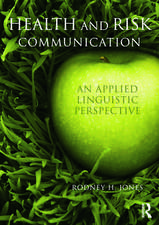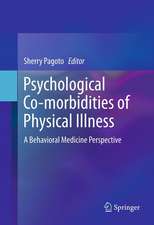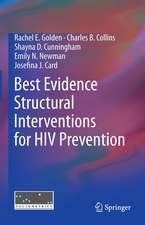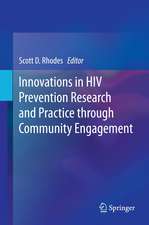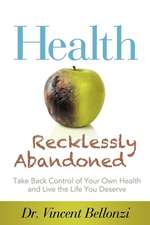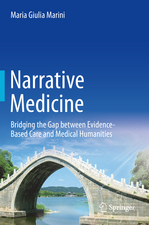Healthy Cities: The Theory, Policy, and Practice of Value-Based Urban Planning
Editat de Evelyne de Leeuw, Jean Simosen Limba Engleză Hardback – 16 feb 2017
Included in the coverage:
- Towards healthy urban governance in the century of the city<
- Healthy cities emerge: Toronto, Ottawa, Copenhagen
- The role of policy coalitions in understanding community participation in healthy cities projects
- Health impact assessment at the local level
- The logic of method for evaluating healthy cities
- Plus: extended reports on healthy cities and communities in North and Latin America, Africa, Europe, Asia, Oceania, and the Middle East
| Toate formatele și edițiile | Preț | Express |
|---|---|---|
| Paperback (1) | 1297.22 lei 6-8 săpt. | |
| Springer – 23 iun 2018 | 1297.22 lei 6-8 săpt. | |
| Hardback (1) | 1304.55 lei 6-8 săpt. | |
| Springer – 16 feb 2017 | 1304.55 lei 6-8 săpt. |
Preț: 1304.55 lei
Preț vechi: 1373.21 lei
-5% Nou
Puncte Express: 1957
Preț estimativ în valută:
249.63€ • 261.29$ • 207.77£
249.63€ • 261.29$ • 207.77£
Carte tipărită la comandă
Livrare economică 31 martie-14 aprilie
Preluare comenzi: 021 569.72.76
Specificații
ISBN-13: 9781493966929
ISBN-10: 1493966928
Pagini: 850
Ilustrații: XXX, 515 p. 78 illus., 70 illus. in color.
Dimensiuni: 155 x 235 x 36 mm
Greutate: 0.94 kg
Ediția:1st ed. 2017
Editura: Springer
Colecția Springer
Locul publicării:New York, NY, United States
ISBN-10: 1493966928
Pagini: 850
Ilustrații: XXX, 515 p. 78 illus., 70 illus. in color.
Dimensiuni: 155 x 235 x 36 mm
Greutate: 0.94 kg
Ediția:1st ed. 2017
Editura: Springer
Colecția Springer
Locul publicării:New York, NY, United States
Cuprins
Part I: Foundations and Historical Backdrop.- Introduction: Aims and Objectives of this Book.- Paleo-Epidemiology, Nomadism and Sedentism: Health and the City.- Urbanisation and Public Health.- Health in Canada in the 1970s and 1980s: Hotbed of Innovation.- Healthy Cities Emerge: Toronto - Ottawa - Copenhagen.- Healthy Cities Grow: Development of International, National, Regional, Linguistic Networks.- Eleven Qualities a City Should Strive to Provide (1986).- Part II: Conceptual Framework and Analysis: Healthy Cities Working from a Joint Value Base.- From Movement to Maturity?- Africa - Anglophone.- Africa - Francophone.- Africa - Maghreb.- Arabic.- Central and South America.- North America.- Europe.- South-East Asia.- Asia-Pacific.- Oceania.- Wrap-Up: Values and Governance for Urban Health.- Part III: The Analysis Continues: Thematic Priorities.- The Role of the Community and Policy Coalitions.- Greening the City.- Environments for Health.- From Urban Projects to Healthy City Policies.- Futuring for Healthy Mega-Cities.- Methodological Reflections on Generating Evidence for Healthy Cities.- Health and Social Impact Assessment for Urban Health.- Conclusion: A Critical Appraisal at the Movement's 25th Birthday.
Notă biografică
Evelyne de Leeuw, PhD, has worked and studied in universities in The Netherlands, the USA, El Salvador, Canada, Denmark and Australia. She holds degrees from Maastricht University and the University of California at Berkeley. Her PhD (1989) investigated the feasibility of developing and implementing Healthy Public Policy at the national level, and analysing that this is virtually impossible she found that whole-of-government health (policy) approaches would be more easily achieved at the local level – hence a commitment to Healthy Cities since the mid-1980s. Her quest for the development and application of health political science was side-lined routinely – by being elected Secretary-General of the Association of Schools of Public Health in the European Region ASPHER (1992-1998), Editor-in-Chief of Health Promotion International (since 2010), foundation director of health promotion research and public health teaching institutions (Syddansk Universitet, 2000-2005, Deakin University 2008-2013), and recreational writing outings. Currently she enjoys being professor and director of the Centre for Health Equity Training Research and Evaluation (CHETRE), based at the University of New South Wales, SouthWestern Sydney Local Health District, and the Ingham Institute.
Jean Simos, PhD, became, after his doctorate thesis, Head of a research group on environmental assessment at the Federal Institute of Technology (EPFL), Lausanne, Switzerland. From 1992 to 2000 he worked as scientific advisor for the Directorate of Public Health, Geneva, Switzerland, and from 2000 to 2007 he became its Deputy Director, in charge of environmental health and health promotion. Since 2007, he is Head of the research group on environmental health, Institute of Global Health, University of Geneva. He was involved in the WHO Healthy Cities European Network from 1994 to 2007 as a local coordinator and since 2009 as a WHO advisor. He is also president of the WHO Collaborating Centre for francophone Healthy Cities, Rennes, France. He took on several missions around the world for WHO, World Bank and Swiss Development & Cooperation Agency as an environmental health expert, particularly in link with health promotion, Healthy Cities, health impact assessment, and multiple criteria decision aid (ELECTRE methods). He is invited professor at the University of Liege, Belgium, since 2011, was invited lecturer in University Paris-Dauphine in 2015, and he is a member of the High Council for Public Health, France, since 2011.
Jean Simos, PhD, became, after his doctorate thesis, Head of a research group on environmental assessment at the Federal Institute of Technology (EPFL), Lausanne, Switzerland. From 1992 to 2000 he worked as scientific advisor for the Directorate of Public Health, Geneva, Switzerland, and from 2000 to 2007 he became its Deputy Director, in charge of environmental health and health promotion. Since 2007, he is Head of the research group on environmental health, Institute of Global Health, University of Geneva. He was involved in the WHO Healthy Cities European Network from 1994 to 2007 as a local coordinator and since 2009 as a WHO advisor. He is also president of the WHO Collaborating Centre for francophone Healthy Cities, Rennes, France. He took on several missions around the world for WHO, World Bank and Swiss Development & Cooperation Agency as an environmental health expert, particularly in link with health promotion, Healthy Cities, health impact assessment, and multiple criteria decision aid (ELECTRE methods). He is invited professor at the University of Liege, Belgium, since 2011, was invited lecturer in University Paris-Dauphine in 2015, and he is a member of the High Council for Public Health, France, since 2011.
Textul de pe ultima copertă
This forward-looking resource recasts the concept of healthy cities as not only a safe, pleasant, and green built environment, but also one that creates and sustains health by addressing social, economic, and political conditions. It describes collaborations between city planning and public health creating a contemporary concept of urban governance—a democratically-informed process that embraces values like equity. Models, critiques, and global examples illustrate institutional change, community input, targeted assessment, and other means of addressing longstanding sources of urban health challenges. In these ambitious pages, healthy cities are rooted firmly in the worldwide movement toward balanced and sustainable urbanization, developed not to disguise or displace entrenched health and social problems, but to encourage and foster solutions.
Included in the coverage:
Included in the coverage:
- Towards healthy urban governance in the century of the city
- Healthy cities emerge: Toronto, Ottawa, Copenhagen
- The role of policy coalitions in understanding community participation in healthy cities projects
- Health impact assessment at the local level
- The logic of method for evaluating healthy cities
- Plus: extended reports on healthy cities and communities in North and Latin America, Africa, Europe, Asia, Oceania, and the Middle East
Caracteristici
Includes extensive case studies organized by geographic and linguistic region
Offers a global perspective from academic and practitioner authors, many of whom have been a part of Healthy Cities since the beginning
Integrates health planning, social planning, and urban planning
Offers a global perspective from academic and practitioner authors, many of whom have been a part of Healthy Cities since the beginning
Integrates health planning, social planning, and urban planning



